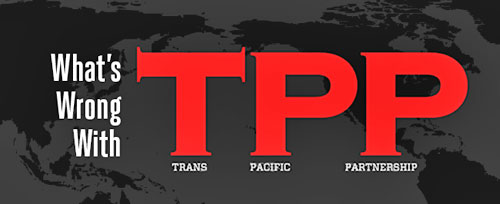|
September 14, 2012 from EFF Website
The Trans-Pacific Partnership (TPP) is a secretive, multi-national trade agreement that threatens to extend restrictive intellectual property (IP) laws across the globe and rewrite international rules on its enforcement.
The main problems are two-fold:
The nine nations currently negotiating the TPP are,
However, Canada and Mexico have also been invited to join the negotiations and it is very likely they will join.
The TPP contains a chapter on intellectual property covering copyright, trademarks, patents and perhaps, geographical indications.
Since the draft text of the agreement has never been officially released to the public, we know from leaked documents, such as the February 2011 draft US TPP IP Rights Chapter, that US negotiators are pushing for the adoption of copyright measures far more restrictive than currently required by international treaties, including the controversial Anti-Counterfeiting Trade Agreement (ACTA).
The TPP Will Rewrite Global Rules on Intellectual Property Enforcement
All signatory countries will be required to conform their domestic laws and policies to the provisions of the Agreement.
In the US, this is likely to further entrench controversial aspects of US copyright law (such as the Digital Millennium Copyright Act [DMCA]) and restrict the ability of Congress to engage in domestic law reform to meet the evolving IP needs of American citizens and the innovative technology sector.
The recently leaked US-proposed IP chapter also includes provisions that appear to go beyond current US law.
The leaked US IP chapter includes many detailed requirements that are more restrictive than current international standards, and would require significant changes to other countries’ copyright laws.
These include obligations for countries to:
In short, countries would have to abandon any efforts to learn from the mistakes of the US and its experience with the DMCA over the last 12 years, and adopt many of the most controversial aspects of US copyright law in their entirety.
At the same time, the US IP chapter does not export the limitations and exceptions in the US copyright regime like fair use, which have enabled freedom of expression and technological innovation to flourish in the US. It includes only a placeholder for exceptions and limitations.
This raises serious concerns about other countries’ sovereignty and the ability of national governments to set laws and policies to meet their domestic priorities.
Non-Transparent and On The Fast Track
Despite the broad scope and far-reaching implications of the TPP, negotiations for the agreement have taken place behind closed doors and outside of the checks and balances that operate at traditional multilateral treaty-making organizations such as the World Intellectual Property Organization and the World Trade Organization.
Like ACTA, the TPP is being negotiated rapidly with little transparency.
During the TPP negotiation round in Chile in February 2011, negotiators received strong messages from prominent civil society groups demanding an end to the secrecy that has shielded TPP negotiations from the scrutiny of national lawmakers and the public.
Letters addressed to government representatives in Australia, Chile, Malaysia, New Zealand and the US emphasized that both the process and effect of the proposed TPP agreement is deeply undemocratic.
TPP negotiators apparently discussed the requests for greater public disclosure during the February 2011 negotiations, but took no action.
Why You Should Care
TPP raises significant concerns about citizens’ freedom of expression, due process, innovation, the future of the Internet’s global infrastructure, and the right of sovereign nations to develop policies and laws that best meet their domestic priorities.
In sum, the TPP puts at risk some of the most fundamental rights that enable access to knowledge for the world’s citizens.
The USTR is pursuing a TPP agreement that will require signatory counties to adopt heightened copyright protection that advances the agenda of the US entertainment and pharmaceutical industries agendas, but omits the flexibilities and exceptions that protect Internet users and technology innovators.
The TPP will affect countries beyond the nine that are currently involved in negotiations. Like ACTA, the TPP Agreement is a plurilateral agreement that will be used to create new heightened global IP enforcement norms.
Countries that are not parties to the negotiation will likely be asked to accede to the TPP as a condition of bilateral trade agreements with the US and other TPP members, or evaluated against the TPP's copyright enforcement standards in the annual Special 301 process administered by the USTR.
by Carolina Rossini and Maira Sutton August 21, 2012
from
EFF
Website
Here’s what you can do
Are you in the United States? Join EFF and more than 22,000 people in sending a message to Congress members to demand an end to these secret backdoor negotiations:
No matter where you are in the world, you can sign on the Stop The Trap petition, which has already signed by more than 100,000 people and organizations.
Local actions around the world
|





